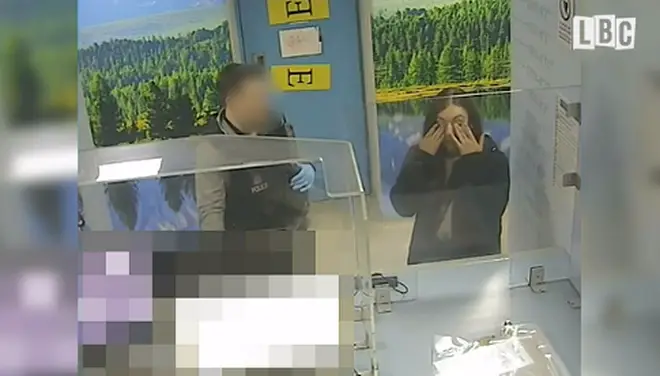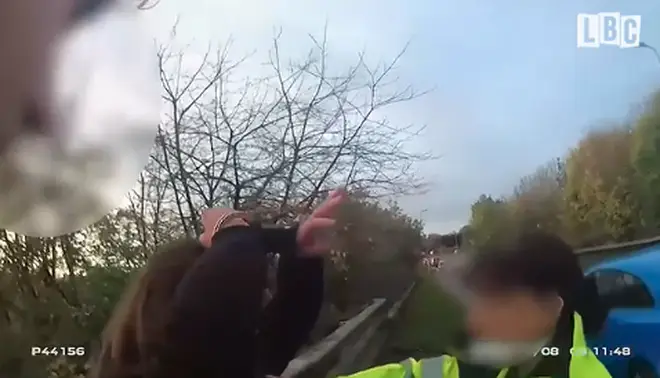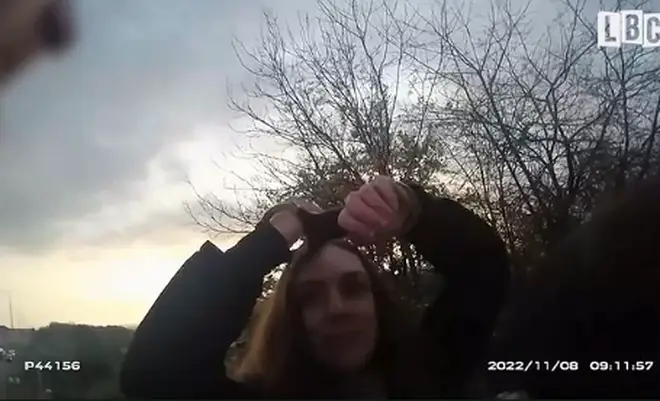
Clive Bull 1am - 4am
7 March 2023, 07:45 | Updated: 17 March 2023, 11:11

LBC Reporter arrested while covering eco-motorway protest
As I watch the footage of what happened to me almost exactly four months ago, I feel like I am looking at a child.
As I watch myself with my head in my hands, sobbing, not knowing when I was going to get out, I want to reach and pull myself out of the screen.
I want to give myself a big hug and tell her don’t worry, you’re sleeping in your own bed tonight, not on this flat hard mat, with just one thin blanket to keep warm.
But I didn’t know that at the time.
It dawned on me in the back of the police van that criminal proceedings against me were now active. They could keep me for 24 hours. I could be charged, and I could be jailed, pending a court appearance. But I hadn’t done anything wrong. I was just working.
In the cell, my head was absolutely pounding. When I watch this footage, and think about how I felt on that day, that feeling immediately comes back. My head starts to hurt, I feel sick, and I feel exhausted.
I burst into tears as soon as I saw the cell. The penny had not dropped until I was led there and saw the metal toilet in one corner and the pad for a bed in the other. Naïvely, I thought I’d be questioned as soon as I got to the station. I was nervous but confident that I had done nothing wrong, and I wanted to prove it to them. Instead, they locked me up.

The officer who arrested me had taken me to the cell and gestured for me to go inside. I could tell he felt sorry for me, and despite how much I hated him for putting me there, I didn’t want him to go.
I didn’t want to be in there alone. I tried to be brave, and I told him I’d be fine, but it was so obvious that I wasn’t. I felt pathetic and so vulnerable, standing in front of this man completely powerless, in floods of tears.
I didn’t know how long I was going to be in there for, but my mind immediately went to the worst-case scenario – I could be here for 24 hours, and even after that I could be charged.
I could not bear to look at where I was, so I sat with my eyes closed and tried to think about other things. I sobbed and sobbed and sobbed.
No one knew where I was. My phone was snatched out of my hand by the second police officer as soon as the handcuffs went on. I asked them several times if I could at least text someone and tell them where I was going, but they refused. I told the officers that they could even talk to them, but they wouldn’t.
It was over two hours from my arrest before I was able to call anyone. I decided to call my editor because I didn’t want my mum to worry.
Turns out I’d been reported as a missing person by LBC because they hadn’t been able to get hold of me, and they’d already contacted her. She was beside herself. I worried about what she was thinking and imagined her reaction in my mind over and over again.
When the handcuffs went on, I was in so much disbelief that I laughed at first. I thought it was all just a big misunderstanding, I didn’t think it would go as far as it did. I’ve always been a confident person, and I’ve been told I’m good at keeping calm in stressful situations – sometimes a little too much!
So I just went along with it, accepted what was happening and tried to make light of it at first to distract myself from the seriousness of what was happening.
But on the way to the station I began to doubt myself, asking myself “have I actually committed this offence?”. I knew the protest was going to happen. But so did everyone else, they published it on Twitter the night before.
Surely the police knew, too? And all I was doing was standing on a bridge filming the protestor, I wasn’t blocking the motorway. I was just doing my job. I was clearly a journalist, but I could have been somebody simply walking by. I was not committing a crime.

My confidence has plummeted now. I’m a lot more nervous, and I constantly doubt myself. My friends and family have noticed the difference. A few weeks on from my arrest, I was trying to get back to normal.
I just wanted to move on.
I was sent to report from a crime scene where the police were. It was dark and early in the morning, and I was alone. Despite the police being there, a sense of panic completely took over me. I did not feel safe.
I didn’t have the confidence to make myself known to the police officers, as I always would whenever I report from a crime scene. I could not wait to get back to the comfort of the office.
I’ve had therapy because of this, and I have even been suffering with physical health issues because of stress.
There was absolutely no question that I was a journalist, and I was not part of the protest. For starters, I was not on the motorway, I was on a public pavement.
The officers could have verified my identity there and then as soon as I showed them my press card. But it was clear that they were intent on arresting me from the word go.
A review of Hertfordshire Police’s actions that day found “officers were directed to arrest and did not develop sufficient grounds prior to exercising their power.” Similarly, it found “The interactions of officers suggest that arrest was the likely outcome regardless of the information obtained.”
No matter what I said or did, they would have arrested me anyway.
You might be wondering why you should care about this?
After all, it “was only 7 hours” (as a few people have said to me), and far worse things have happened to others. I am not writing this for sympathy.
I am writing this, and sharing this footage, because it is unbelievable that this happened to a journalist in Britain, who was not committing any crime.
I was taken out of the game and prevented on reporting on something. It doesn’t matter what that thing was. If it isn’t jeopardising national security or a criminal case, and if it is in the public interest, you deserve to know about it.
You deserve to know why you might not have been able to get to work, or a doctor’s appointment, or a family occasion on that day. You deserve to hear both sides of the argument – the view of the protestors and the view of those people whose lives they are disrupting – and make your own mind up.
But I was blocked from presenting those facts to you.
The Public Order Bill is set to grant police sweeping new powers to crack down on protestors who use tactics such as blocking roads.
Following my arrest, an amendment to the law will be passed today, which will ensure the police cannot exercise those powers for the sole purpose of preventing a person from reporting on a protest or reporting on how the police are using their new powers.
But, this is bigger than me and it’s bigger than Just Stop Oil.
It protects your freedom of speech and ensures nothing that is in your interest to know about is censored. You cannot have freedom of speech and a proper democracy without a free press. I know that many people won’t care that they didn’t hear about Just Stop Oil on that day – but what will it be the next day?
If you begin censoring the press, where does that lead? What questions might we be prevented from asking, on your behalf?

I was delighted to have the support of the former Home Secretary and Conservative Party leader, Lord Michael Howard, who defied a three-line whip to vote for the amendment that was tabled in response to my arrest in the Lords.
I was also thrilled that Conservative Peer Lord Chris Patten voted for it - the last governor of Hong Kong. Conservative Lord Cormack also made a powerful speech in favour of it, saying “freedom of speech cannot exist properly unless there is a free press – it may often say things we deplore, may often get the balance wrong.
But it must have freedom. A free society depends upon a free parliament and free speech, and it depends upon the free press, and free broadcasting.”
I want to express my immense gratitude to Baroness Shami Chakrabarti who tabled this amendment and has supported me from that very first day.
She’s fought tirelessly for this result – for the protection of journalists, and the protection of free speech.
I admit that I have considered leaving journalism because of what happened to me. I felt so unsafe and my confidence was so low.
But I now feel more determined than ever to keep bringing you the facts.
I don’t get to decide them, but I do have the immense privilege of being able to tell you them and help to inform your views.
I hope that will never change, for me or any other journalist.